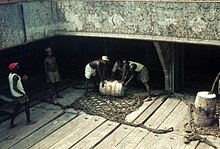Crewboys

The crewboys were African sailors who originally came from Liberia and who worked on cargo ships during a tour of the West African coast .
history
The English term for a ship's crew or crew is crew. The name Crew was linguistically mixed with the name of the African tribe of the Krus , who lived in the interior of the country. About 500 years ago these Krus moved to the coast of what is now Liberia for reasons unknown, where they initially lived from fishing . When the planned trade with West Africa promised profits in the middle to the end of the nineteenth century, English cargo steamers, later also those of other nations, called at West African coasts. Local men were needed who could work on board under difficult climatic conditions and who were familiar with the sea.
The crewboys on board
The crew Boys were at the beginning of a round trip in ports like Freetown ( Sierra Leone ), Monrovia (Liberia) and Lagos ( Nigeria ) patterned and taken on board. In the early years, the captain took care of this inspection, later, when the ships called in West Africa on the liner service, the ship agencies were responsible for it. The crewboys came to the ship in boats, as the ports on the west coast were mostly shipping ports . Depending on the size of the ship, the number of ports called, the type of cargo, etc. it was between 30 and 70 men, led by a foreman ( chief ) and accompanied by a cook. The crew Boys who brought only the essentials to Have been in the bow under the jaw , in Kabelgatt housed in the deck houses and everywhere on deck, where space was.
The crew Boys worked as stevedores in the hatch from which the charge in Reede Harbor deleted was and loaded into lying alongside boats. They operated the winches , set the loading booms , made the ship clear to sea, carried out painting and cleaning work, worked as a clothes washer, etc. They not only supported the regular crew in almost every respect, but carried out many tasks independently under the supervision of their foreman and the ship's command . Heavy and dangerous work had the crew Boys regularly in the shipping of logs run (Logs), the u. a. in Douala ( Cameroon ), Port-Gentil ( Gabon ) or Pointe-Noire ( Republic of the Congo ). This work was particularly difficult when the tree trunks had to be put together into long rafts and loaded from the water with their own loading gear , as on the Volta River east of Accra . - The crewboys stayed on board during the entire four to five week round trip and were disembarked in their home port.
The end of the crewboys
With the global introduction of the container in the mid-1960s and the associated, complete conversion of the transport system in merchant shipping , the crewboys were no longer needed and gradually disappeared from the ships. - In addition, there has been an export ban on precious woods in most countries for several years .
Volta River, two women in the boat, behind them a raft made of tree trunks
literature
- Margarethe Hopfer Von Eckenbrecher: What Africa gave and took from me. Experiences of a German woman in South West Africa 1902–1936 . 8th edition. Verlag ES Mittler & Sohn , Hamburg 1940, p. 323.
- Hans Patschke: Frequency change. A radio operator tells his eventful life . Jürgen Ruszkowski, Hamburg, publisher of the maritime, yellow book series Zeitzeugen des Everytags , Volume 37, 1982.
- Jane Martin: Crumbs "Down the Coast" - Liberian Migrants on the West African Coast in the 19th and early 20th Centuries. The International Journal of African Historical Studies, Vol. 18, No. 3, 401-423, Published by Boston University African Studies Center 1985.
Individual evidence
- ^ Wikisource 1911 Encyclopædia Britannica, Volume 15 - Crumbs
- ↑ Olaf Kanter, The Last Son of the Kru Tribe ( Memento of the original from February 17, 2016 in the Internet Archive ) Info: The archive link was inserted automatically and has not yet been checked. Please check the original and archive link according to the instructions and then remove this notice. . With photos by Guillaume Herbaut. In: mare online , issue no.67 from April 2008, accessed on February 17, 2016.
- ↑ Peter Nennstiel: Contemporary witness of the post-war years ( Memento of the original from February 17, 2016 in the Internet Archive ) Info: The archive link was inserted automatically and has not yet been checked. Please check the original and archive link according to the instructions and then remove this notice. with the MS Nereus of the DDG Neptun on the West Africa voyage, accessed on February 17, 2016.
- ^ German Africa Line - MS Cameroon . Thomas Kraft Collection, accessed on February 17, 2016.
Remarks
- ↑ Magarethe von Eckenbrecher reports in her book What Africa gave me and took from 100 men who had strengthened their own ship's crew in the first few years.






